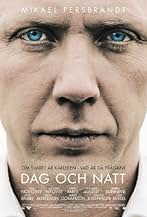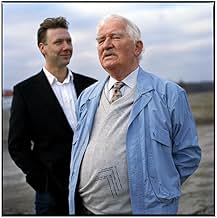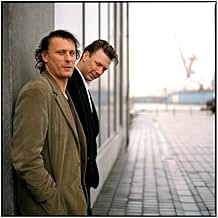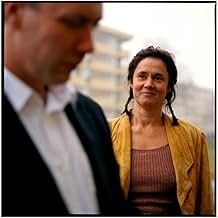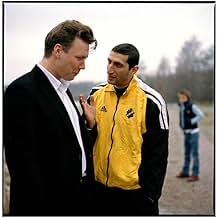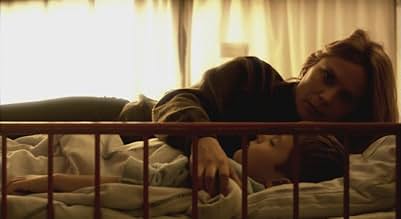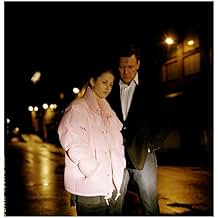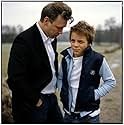IMDb RATING
6.6/10
1.7K
YOUR RATING
Thomas has decided to die, and spends his last day driving around to say good-bye to everybody, his son, wife, mistress and all others. Nobody understands that this good-bye is definite, and... Read allThomas has decided to die, and spends his last day driving around to say good-bye to everybody, his son, wife, mistress and all others. Nobody understands that this good-bye is definite, and still he says things they will never forget.Thomas has decided to die, and spends his last day driving around to say good-bye to everybody, his son, wife, mistress and all others. Nobody understands that this good-bye is definite, and still he says things they will never forget.
- Awards
- 2 wins & 11 nominations
- Director
- Writers
- All cast & crew
- Production, box office & more at IMDbPro
Storyline
Did you know
- TriviaAIK (short for Allmänna Idrottsklubben), the soccer (football) team Kristian supports, is part of the Allsvenskan League (the top level league) in Sweden, as is Malmo, the other team he mentions.
- GoofsIn several shots the water/steam on the car windows varies greatly between cuts.
Featured review
It's not giving away anything about this movie to tell you that it's about a man who commits suicide. As viewer, you know that in the first thirty seconds when the voice-over narrator informs us. So, if the topic of in-your-face suicide doesn't interest you, then read no further.
Before discussing the story and plot, however, it's better I cover some aspects about the cinematography and the narrative structure. By knowing those now, I think you'll appreciate the story even more.
The title, for starters, is a symbol for the duality of our existence: all of the action is played out in one full day, from morning to night. Being diurnal creatures, day is when most people are truly alive; night is when we all die the mini-death of sleep. The man who suicides, Thomas (Mikael Persbrandt), is literally on the road to death because he is in his car for 99% of the whole movie, beginning in daylight but ending it all at night.
In a similar fashion, all yes, all of the camera work is shot from the front of the car Thomas is driving, face-on to Thomas and any passengers he has with him. Now, you would think that would produce a mind-numbing result for the viewer, as the director keeps cutting, back and forth, from Thomas talking to the person in the passenger seat who responds to Thomas. Only rarely do we see Thomas and a passenger in the same frame; most of the time, the viewer sees only one person at a time a clear metaphor for the deepening separation Thomas feels for all relatives, friends and even strangers who get into the car, at different times during the day. From that perspective, the camera works voyeuristically, perhaps the closest we ever want to be to watching a person bent on self-destruction.
With such a mise-en-scene, everything depends upon the script which must be faultless and the actors, all of whom must be able to act convincingly while having the camera directly in front. You'll no doubt recall that Jodie Foster received an academy award for her effort in Silence of the Lambs, with a lot of her acting for that story done facing the camera. It's a most difficult technique to do with skill. Well, not only is the script up to scratch, the acting from Persbrandt is faultless, in my opinion, for the entire 95 minutes run time. And, the supporting cast is not far behind.
Hence, from the director's chair, there doesn't seem to be much to do. Yet, when there is little action, much dialog and the need for genuine facial expressions to convey true emotion, the director is actually working hard, perhaps even harder than the actors. So, I take my hat off to Simon Staho for creating a mini-masterpiece.
Now - the story is very basic: Thomas has decided to kill himself and spends the last day of his life driving around, visiting and picking up his estranged wife, his current lover, his son, his best friend, the only woman he ever really loved, a whore, a stranger, his son's soccer coach and his mother, all in succession. Why? Because he wants to say goodbye, perhaps seek forgiveness from some, perhaps tell others to f*** off. Why does he want to suicide? For many reasons that are explained during the conversations Thomas has with each person, all resulting in his complete loss of will to live.
He takes his son, Emil (Sam Kessel), to school first and tries to destroy any love Emil may feel for him; he picks up his lover, and then tells her that the affair is over, he's going off to New York to live; next, his wife and he go to sign the divorce papers and he resists her attempts to patch things up; then, he picks up his best friend, Jacob (Michael Nyqvist) who is also his wife's current lover and tells him to f*** off; briefly, Thomas talks with an old man about life; then goes to see the only woman he truly loves a truly poignant scene - followed by his son's soccer coach. After leaving the soccer field, Thomas goes to a car wash where he breaks down completely as the car is washed. He pulls himself together finally and then goes to see his old mother who is suffering from Alzheimers.
He takes his mother for a last drive to the beach, a scene that is perhaps the most harrowing in the movie; then, he drives back to the city where he picks up a whore and tries to convince her to use his gun to shoot him, offering a substantial payment to her for the job. When she refuses and leaves, he drives off into the darkening night. Eventually he stops the car, while raging thunder and lightning provides the only cliché for the whole film, and he gets out his gun...
Needles to say, almost, this is a real downer. Only those who can stomach the whole idea of watching a wannabe suicide should see this one. And, it's definitely not for children.
A final thought: I wonder how the writer/director Staho convinced producers to put up the money?
Before discussing the story and plot, however, it's better I cover some aspects about the cinematography and the narrative structure. By knowing those now, I think you'll appreciate the story even more.
The title, for starters, is a symbol for the duality of our existence: all of the action is played out in one full day, from morning to night. Being diurnal creatures, day is when most people are truly alive; night is when we all die the mini-death of sleep. The man who suicides, Thomas (Mikael Persbrandt), is literally on the road to death because he is in his car for 99% of the whole movie, beginning in daylight but ending it all at night.
In a similar fashion, all yes, all of the camera work is shot from the front of the car Thomas is driving, face-on to Thomas and any passengers he has with him. Now, you would think that would produce a mind-numbing result for the viewer, as the director keeps cutting, back and forth, from Thomas talking to the person in the passenger seat who responds to Thomas. Only rarely do we see Thomas and a passenger in the same frame; most of the time, the viewer sees only one person at a time a clear metaphor for the deepening separation Thomas feels for all relatives, friends and even strangers who get into the car, at different times during the day. From that perspective, the camera works voyeuristically, perhaps the closest we ever want to be to watching a person bent on self-destruction.
With such a mise-en-scene, everything depends upon the script which must be faultless and the actors, all of whom must be able to act convincingly while having the camera directly in front. You'll no doubt recall that Jodie Foster received an academy award for her effort in Silence of the Lambs, with a lot of her acting for that story done facing the camera. It's a most difficult technique to do with skill. Well, not only is the script up to scratch, the acting from Persbrandt is faultless, in my opinion, for the entire 95 minutes run time. And, the supporting cast is not far behind.
Hence, from the director's chair, there doesn't seem to be much to do. Yet, when there is little action, much dialog and the need for genuine facial expressions to convey true emotion, the director is actually working hard, perhaps even harder than the actors. So, I take my hat off to Simon Staho for creating a mini-masterpiece.
Now - the story is very basic: Thomas has decided to kill himself and spends the last day of his life driving around, visiting and picking up his estranged wife, his current lover, his son, his best friend, the only woman he ever really loved, a whore, a stranger, his son's soccer coach and his mother, all in succession. Why? Because he wants to say goodbye, perhaps seek forgiveness from some, perhaps tell others to f*** off. Why does he want to suicide? For many reasons that are explained during the conversations Thomas has with each person, all resulting in his complete loss of will to live.
He takes his son, Emil (Sam Kessel), to school first and tries to destroy any love Emil may feel for him; he picks up his lover, and then tells her that the affair is over, he's going off to New York to live; next, his wife and he go to sign the divorce papers and he resists her attempts to patch things up; then, he picks up his best friend, Jacob (Michael Nyqvist) who is also his wife's current lover and tells him to f*** off; briefly, Thomas talks with an old man about life; then goes to see the only woman he truly loves a truly poignant scene - followed by his son's soccer coach. After leaving the soccer field, Thomas goes to a car wash where he breaks down completely as the car is washed. He pulls himself together finally and then goes to see his old mother who is suffering from Alzheimers.
He takes his mother for a last drive to the beach, a scene that is perhaps the most harrowing in the movie; then, he drives back to the city where he picks up a whore and tries to convince her to use his gun to shoot him, offering a substantial payment to her for the job. When she refuses and leaves, he drives off into the darkening night. Eventually he stops the car, while raging thunder and lightning provides the only cliché for the whole film, and he gets out his gun...
Needles to say, almost, this is a real downer. Only those who can stomach the whole idea of watching a wannabe suicide should see this one. And, it's definitely not for children.
A final thought: I wonder how the writer/director Staho convinced producers to put up the money?
- RJBurke1942
- Oct 17, 2008
- Permalink
- How long is Day and Night?Powered by Alexa
Details
- Runtime1 hour 35 minutes
- Color
- Sound mix
- Aspect ratio
- 2.35 : 1
Contribute to this page
Suggest an edit or add missing content


